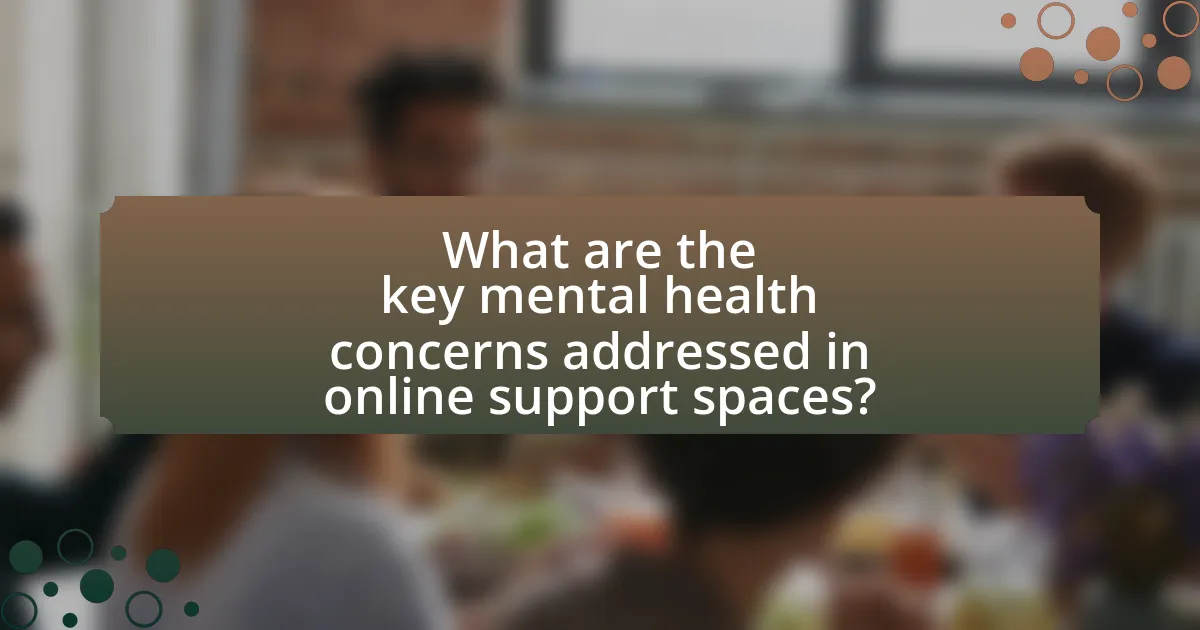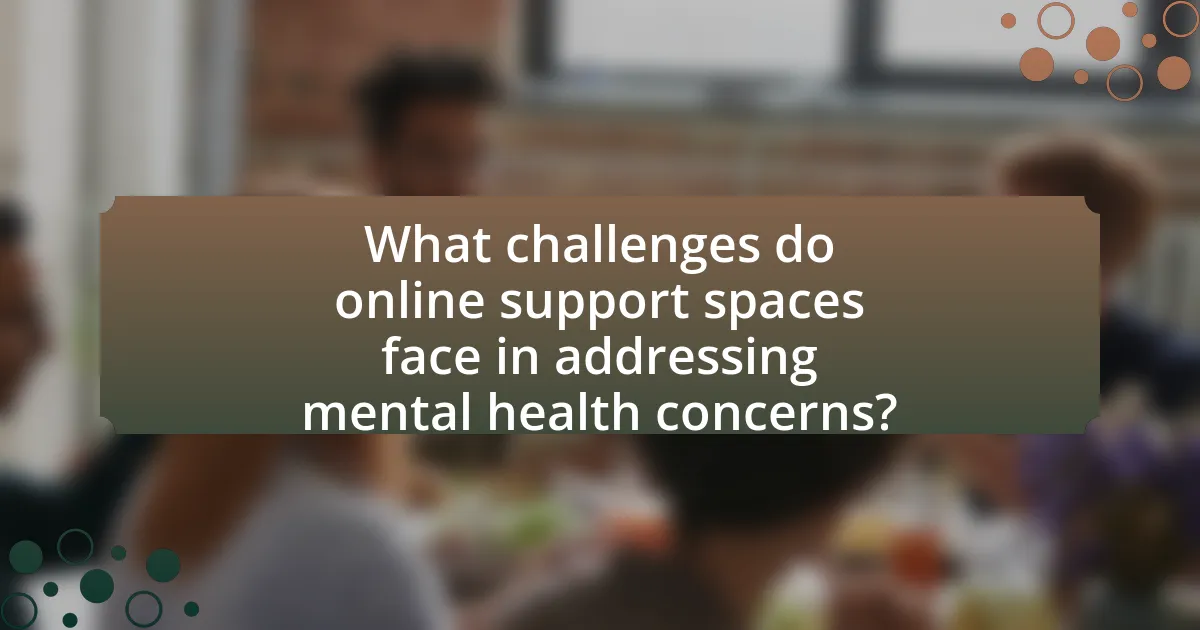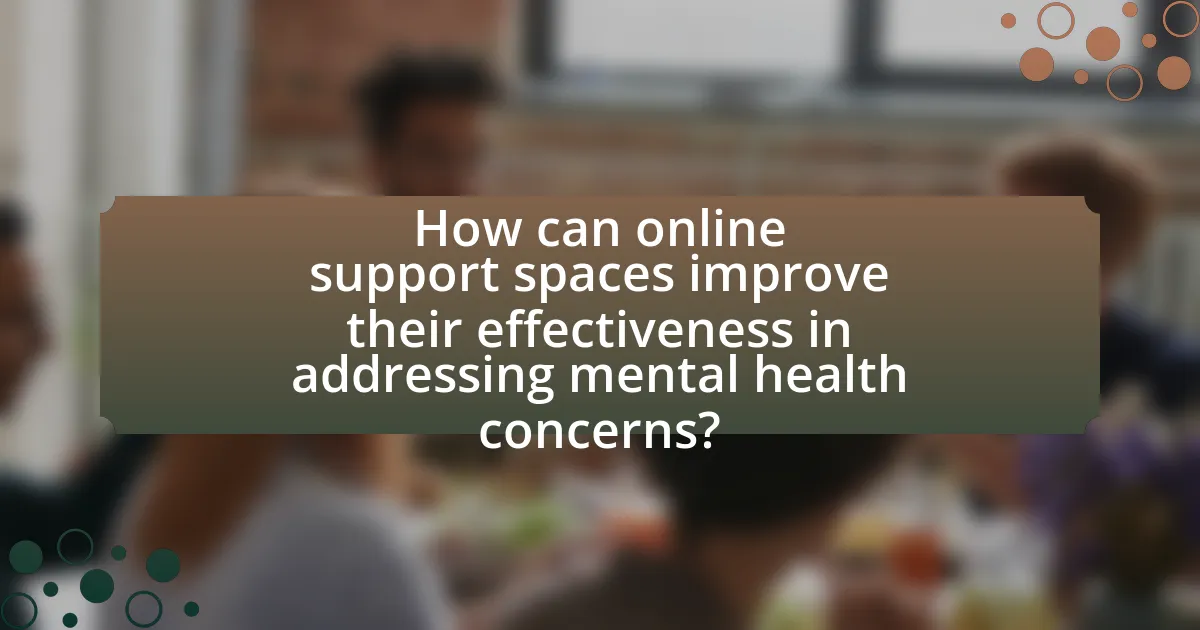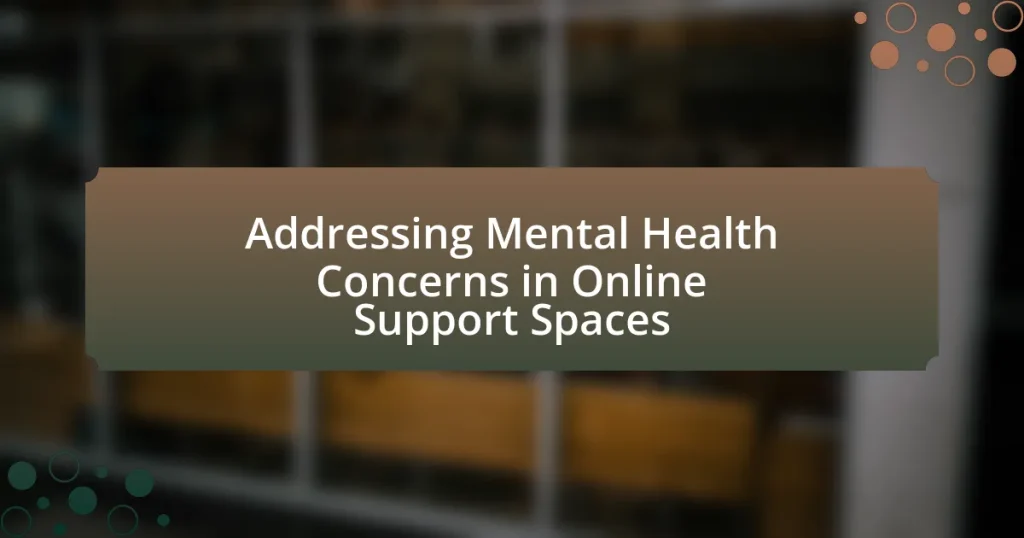The article focuses on addressing mental health concerns in online support spaces, highlighting key issues such as anxiety, depression, loneliness, and stress management. It examines how these platforms provide tailored resources and community support, significantly reducing feelings of isolation and improving emotional well-being. The discussion includes the common mental health conditions addressed, the role of anonymity and privacy, the importance of moderation, and best practices for enhancing user experience. Additionally, it outlines the impact of community support on mental health outcomes and the challenges faced by online support environments.

What are the key mental health concerns addressed in online support spaces?
Key mental health concerns addressed in online support spaces include anxiety, depression, loneliness, and stress management. These platforms provide individuals with a sense of community and understanding, which is crucial for those experiencing these issues. Research indicates that online support can significantly reduce feelings of isolation and improve emotional well-being, as evidenced by a study published in the Journal of Medical Internet Research, which found that participants reported enhanced coping strategies and reduced symptoms of anxiety and depression after engaging in online support groups.
How do online support spaces cater to various mental health issues?
Online support spaces cater to various mental health issues by providing tailored resources, community support, and professional guidance specific to each condition. These platforms often feature forums, chat rooms, and virtual therapy sessions that address a wide range of mental health concerns, including anxiety, depression, PTSD, and more. For instance, studies show that online support groups can significantly reduce feelings of isolation and improve coping strategies among participants, as evidenced by a 2020 study published in the Journal of Medical Internet Research, which found that 70% of users reported improved mental well-being after engaging in online support communities. Additionally, many platforms collaborate with mental health professionals to offer evidence-based content and interventions, ensuring that users receive accurate and helpful information relevant to their specific issues.
What specific mental health conditions are commonly discussed in these spaces?
Commonly discussed mental health conditions in online support spaces include anxiety disorders, depression, bipolar disorder, and post-traumatic stress disorder (PTSD). These conditions are frequently addressed due to their prevalence and impact on individuals’ daily lives. For instance, the Anxiety and Depression Association of America reports that anxiety disorders affect 40 million adults in the United States, highlighting the significant need for support and discussion in these online communities. Additionally, the National Institute of Mental Health indicates that major depressive disorder affects approximately 7% of the U.S. population, further underscoring the relevance of these topics in online support environments.
How do users express their mental health concerns in online forums?
Users express their mental health concerns in online forums primarily through written posts that detail their feelings, experiences, and struggles. These expressions often include personal narratives, questions seeking advice, and requests for support from others who may have similar experiences. Research indicates that anonymity in online forums encourages users to share sensitive information more freely, leading to a higher volume of candid discussions about mental health issues. For instance, a study published in the Journal of Medical Internet Research found that users frequently utilize forums to articulate feelings of anxiety, depression, and loneliness, highlighting the importance of peer support in these digital spaces.
Why is it important to address mental health in online support environments?
Addressing mental health in online support environments is crucial because these platforms serve as primary resources for individuals seeking help. Research indicates that approximately 1 in 5 adults experience mental illness, and online support can provide accessible, immediate assistance. Furthermore, studies show that online communities can reduce feelings of isolation and promote recovery by fostering connections among users. For instance, a study published in the Journal of Medical Internet Research found that participants in online support groups reported significant improvements in mental health outcomes. Thus, prioritizing mental health in these environments enhances user engagement and effectiveness of support.
What impact does online support have on individuals’ mental health?
Online support positively impacts individuals’ mental health by providing accessible resources, community connection, and emotional validation. Research indicates that individuals who engage in online support groups report lower levels of anxiety and depression, as these platforms facilitate sharing experiences and coping strategies. A study published in the Journal of Medical Internet Research found that participants in online support communities experienced significant improvements in mental health outcomes, highlighting the effectiveness of peer support in reducing feelings of isolation and enhancing emotional well-being.
How does community support enhance mental health outcomes?
Community support enhances mental health outcomes by providing individuals with a sense of belonging and reducing feelings of isolation. Research indicates that social connections can significantly lower the risk of mental health issues; for instance, a study published in the American Journal of Psychiatry found that individuals with strong social support networks are 50% more likely to report better mental health. Additionally, community support facilitates access to resources and information, empowering individuals to seek help and engage in positive coping strategies. This collective engagement fosters resilience and promotes overall well-being, as evidenced by findings from the World Health Organization, which highlight the importance of social support in improving mental health outcomes.

What challenges do online support spaces face in addressing mental health concerns?
Online support spaces face significant challenges in addressing mental health concerns, primarily due to issues of anonymity, lack of professional oversight, and the potential for misinformation. Anonymity can lead to users feeling less accountable for their actions and sharing harmful advice without fear of repercussions. The absence of trained mental health professionals in many online forums can result in inadequate support and the spread of unverified information, which can exacerbate mental health issues. Additionally, the vast amount of content generated can make it difficult for users to discern credible sources from unreliable ones, leading to confusion and potential harm. These challenges highlight the need for improved moderation and the integration of professional guidance in online mental health support platforms.
How do anonymity and privacy issues affect discussions in online support spaces?
Anonymity and privacy issues significantly impact discussions in online support spaces by influencing participants’ willingness to share personal experiences and seek help. When users feel secure in their anonymity, they are more likely to disclose sensitive information, which fosters open dialogue and peer support. Conversely, concerns about privacy breaches can lead to self-censorship, reducing the authenticity and depth of discussions. Research indicates that 70% of individuals in online support groups report feeling more comfortable sharing personal struggles when anonymity is assured, highlighting the critical role of these factors in promoting effective communication and support.
What are the risks associated with anonymity in mental health discussions?
Anonymity in mental health discussions poses several risks, including the potential for misinformation, lack of accountability, and the possibility of harmful interactions. Misinformation can spread easily in anonymous settings, as individuals may share unverified or misleading information about mental health conditions and treatments. The lack of accountability can lead to individuals feeling emboldened to engage in harmful behaviors, such as cyberbullying or promoting unhealthy coping mechanisms, without fear of repercussions. Additionally, anonymity may hinder the establishment of trust and meaningful connections among participants, which are crucial for effective support. Research indicates that while anonymity can encourage open dialogue, it can also create an environment where negative behaviors flourish, undermining the overall purpose of mental health discussions.
How can privacy be maintained while providing support?
Privacy can be maintained while providing support by implementing strict data protection protocols and ensuring confidentiality in communications. Organizations can utilize encrypted messaging platforms to safeguard conversations and limit access to sensitive information to authorized personnel only. Additionally, anonymizing user data and obtaining informed consent before sharing any personal details can further enhance privacy. Research indicates that 70% of individuals feel more secure when their data is protected, highlighting the importance of these measures in fostering trust in online support environments.
What role do moderators play in online mental health support communities?
Moderators in online mental health support communities play a crucial role in maintaining a safe and supportive environment for users. They enforce community guidelines, ensuring that discussions remain respectful and constructive, which is essential for fostering trust among participants. Research indicates that effective moderation can significantly reduce instances of harmful behavior, such as bullying or misinformation, thereby enhancing the overall user experience. Additionally, moderators often provide resources and guidance, helping users navigate their mental health challenges more effectively. Their presence not only facilitates healthy interactions but also contributes to the community’s credibility and reliability as a support system.
How do moderators ensure a safe environment for users?
Moderators ensure a safe environment for users by actively monitoring interactions and enforcing community guidelines. They implement measures such as removing harmful content, issuing warnings or bans to users who violate rules, and providing resources for mental health support. Research indicates that platforms with effective moderation see a reduction in toxic behavior, which contributes to a more supportive atmosphere. For instance, a study by the Pew Research Center found that 70% of users feel safer in online communities with active moderation.
What guidelines should moderators follow to address mental health concerns effectively?
Moderators should prioritize empathy, active listening, and clear communication when addressing mental health concerns effectively. Empathy allows moderators to connect with individuals experiencing distress, fostering a supportive environment. Active listening ensures that moderators fully understand the concerns being expressed, which is crucial for providing appropriate responses. Clear communication helps convey important information and resources without adding to the individual’s anxiety.
Research indicates that supportive interactions can significantly improve individuals’ mental well-being, as highlighted in a study published in the Journal of Affective Disorders, which found that empathetic communication reduces feelings of isolation and distress. By adhering to these guidelines, moderators can create a safe and constructive space for individuals seeking support.

How can online support spaces improve their effectiveness in addressing mental health concerns?
Online support spaces can improve their effectiveness in addressing mental health concerns by implementing structured moderation and evidence-based resources. Structured moderation ensures that discussions remain safe and supportive, reducing the risk of harmful interactions. Evidence-based resources, such as links to professional help and educational materials, provide users with reliable information and guidance. Research indicates that platforms with trained moderators and curated content see higher user satisfaction and engagement, which correlates with better mental health outcomes. For instance, a study published in the Journal of Medical Internet Research found that online communities with active moderation significantly improved users’ perceived social support and mental well-being.
What best practices can be implemented in online support communities?
Best practices that can be implemented in online support communities include establishing clear guidelines for respectful communication, ensuring confidentiality, and providing trained moderators to facilitate discussions. Clear communication guidelines help maintain a safe environment, as evidenced by studies showing that structured interactions reduce conflict and enhance user engagement. Ensuring confidentiality is crucial for participants to feel secure sharing personal experiences, which is supported by research indicating that privacy concerns can deter individuals from seeking help. Additionally, having trained moderators can improve the quality of interactions and provide immediate support, as demonstrated by platforms that report higher satisfaction rates when moderators are present to guide conversations.
How can training for moderators enhance the support provided?
Training for moderators enhances the support provided by equipping them with essential skills to effectively manage discussions and address mental health concerns. Well-trained moderators can identify signs of distress, facilitate constructive conversations, and create a safe environment for users. Research indicates that trained moderators are more adept at de-escalating conflicts and providing appropriate resources, which leads to improved user satisfaction and engagement in online support spaces. For instance, a study published in the Journal of Online Behavior found that platforms with trained moderators reported a 30% increase in user-reported satisfaction and a significant reduction in harmful interactions.
What resources can be shared to educate users about mental health?
Educational resources that can be shared to inform users about mental health include websites, online courses, and literature. Websites such as the National Alliance on Mental Illness (NAMI) and MentalHealth.gov provide comprehensive information on mental health conditions, treatment options, and support resources. Online courses offered by platforms like Coursera and edX cover topics such as mental health awareness and coping strategies, often created in collaboration with universities and mental health organizations. Additionally, literature such as the DSM-5 (Diagnostic and Statistical Manual of Mental Disorders) and self-help books authored by mental health professionals offer valuable insights and guidance. These resources are validated by their widespread use in educational settings and their endorsement by mental health professionals.
What strategies can users adopt to maximize their experience in online support spaces?
Users can maximize their experience in online support spaces by actively engaging with the community, setting clear intentions for their participation, and utilizing available resources effectively. Engaging with the community fosters connection and support, which is crucial for mental health. Setting clear intentions helps users focus on their specific needs, whether seeking advice or offering support. Utilizing resources, such as guidelines and FAQs provided by the platform, enhances understanding and navigation of the space. Research indicates that active participation in supportive environments can lead to improved mental well-being, as noted in a study published in the Journal of Internet Research, which found that users who engage meaningfully report higher satisfaction and emotional support.
How can individuals engage constructively in discussions about mental health?
Individuals can engage constructively in discussions about mental health by actively listening, showing empathy, and using respectful language. Active listening involves fully concentrating on what the other person is saying, which fosters a supportive environment. Empathy allows individuals to understand and share the feelings of others, creating a sense of connection and validation. Using respectful language helps to avoid stigmatization and promotes open dialogue. Research indicates that supportive communication can significantly improve mental health outcomes, as seen in studies published in the Journal of Mental Health, which highlight the importance of social support in mental well-being.
What self-care practices can users implement while participating in online support?
Users can implement several self-care practices while participating in online support, including setting boundaries, engaging in mindfulness techniques, and taking regular breaks. Setting boundaries helps users manage their emotional investment and prevents burnout, which is crucial in maintaining mental health during online interactions. Mindfulness techniques, such as deep breathing or meditation, can enhance emotional regulation and reduce anxiety, allowing users to remain present and focused. Taking regular breaks is essential to avoid information overload and emotional fatigue, as studies indicate that frequent breaks can improve overall well-being and cognitive function. These practices collectively support users in maintaining their mental health while engaging in online support spaces.
